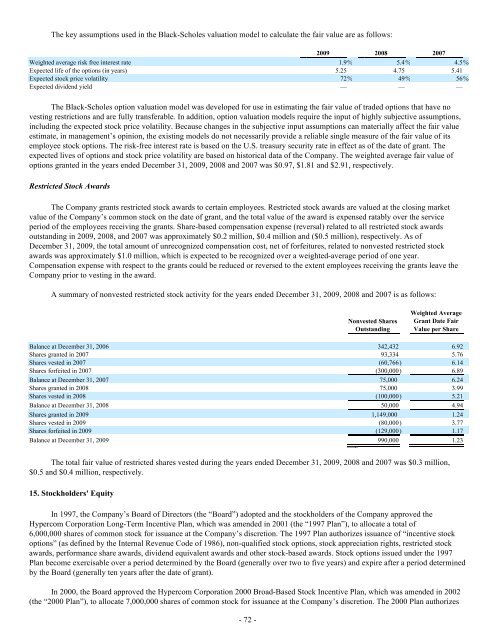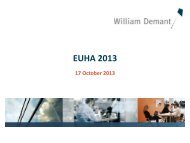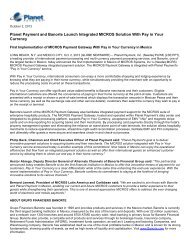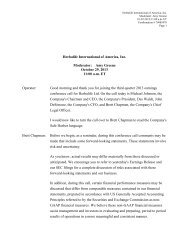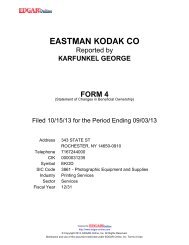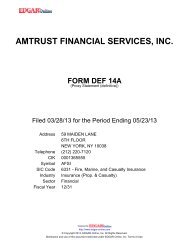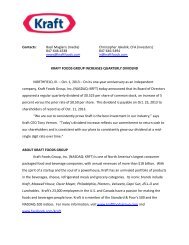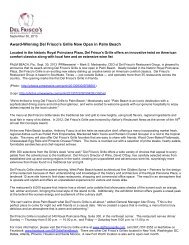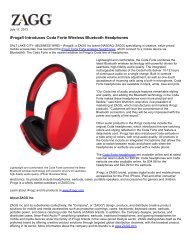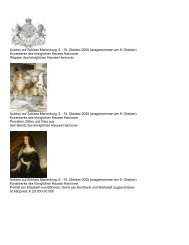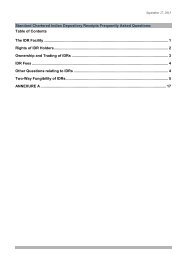Hypercom Corporation Annual Report - CiteSeer
Hypercom Corporation Annual Report - CiteSeer
Hypercom Corporation Annual Report - CiteSeer
Create successful ePaper yourself
Turn your PDF publications into a flip-book with our unique Google optimized e-Paper software.
The key assumptions used in the Black-Scholes valuation model to calculate the fair value are as follows:<br />
2009 2008 2007<br />
Weighted average risk free interest rate 1.9 % 5.4 % 4.5 %<br />
Expected life of the options (in years) 5.25 4.75 5.41<br />
Expected stock price volatility 72 % 49 % 56 %<br />
Expected dividend yield — — —<br />
The Black-Scholes option valuation model was developed for use in estimating the fair value of traded options that have no<br />
vesting restrictions and are fully transferable. In addition, option valuation models require the input of highly subjective assumptions,<br />
including the expected stock price volatility. Because changes in the subjective input assumptions can materially affect the fair value<br />
estimate, in management’s opinion, the existing models do not necessarily provide a reliable single measure of the fair value of its<br />
employee stock options. The risk-free interest rate is based on the U.S. treasury security rate in effect as of the date of grant. The<br />
expected lives of options and stock price volatility are based on historical data of the Company. The weighted average fair value of<br />
options granted in the years ended December 31, 2009, 2008 and 2007 was $0.97, $1.81 and $2.91, respectively.<br />
Restricted Stock Awards<br />
The Company grants restricted stock awards to certain employees. Restricted stock awards are valued at the closing market<br />
value of the Company’s common stock on the date of grant, and the total value of the award is expensed ratably over the service<br />
period of the employees receiving the grants. Share-based compensation expense (reversal) related to all restricted stock awards<br />
outstanding in 2009, 2008, and 2007 was approximately $0.2 million, $0.4 million and ($0.5 million), respectively. As of<br />
December 31, 2009, the total amount of unrecognized compensation cost, net of forfeitures, related to nonvested restricted stock<br />
awards was approximately $1.0 million, which is expected to be recognized over a weighted-average period of one year.<br />
Compensation expense with respect to the grants could be reduced or reversed to the extent employees receiving the grants leave the<br />
Company prior to vesting in the award.<br />
A summary of nonvested restricted stock activity for the years ended December 31, 2009, 2008 and 2007 is as follows:<br />
- 72 -<br />
Nonvested Shares<br />
Outstanding<br />
Weighted Average<br />
Grant Date Fair<br />
Value per Share<br />
Balance at December 31, 2006 342,432 6.92<br />
Shares granted in 2007 93,334 5.76<br />
Shares vested in 2007 (60,766 ) 6.14<br />
Shares forfeited in 2007 (300,000 ) 6.89<br />
Balance at December 31, 2007<br />
75,000 6.24<br />
Shares granted in 2008<br />
75,000 3.99<br />
Shares vested in 2008 (100,000 ) 5.21<br />
Balance at December 31, 2008 50,000 4.94<br />
Shares granted in 2009<br />
1,149,000 1.24<br />
Shares vested in 2009 (80,000 ) 3.77<br />
Shares forfeited in 2009 (129,000 ) 1.17<br />
Balance at December 31, 2009 990,000 1.23<br />
The total fair value of restricted shares vested during the years ended December 31, 2009, 2008 and 2007 was $0.3 million,<br />
$0.5 and $0.4 million, respectively.<br />
15. Stockholders' Equity<br />
In 1997, the Company’s Board of Directors (the “Board”) adopted and the stockholders of the Company approved the<br />
<strong>Hypercom</strong> <strong>Corporation</strong> Long-Term Incentive Plan, which was amended in 2001 (the “1997 Plan”), to allocate a total of<br />
6,000,000 shares of common stock for issuance at the Company’s discretion. The 1997 Plan authorizes issuance of “incentive stock<br />
options” (as defined by the Internal Revenue Code of 1986), non-qualified stock options, stock appreciation rights, restricted stock<br />
awards, performance share awards, dividend equivalent awards and other stock-based awards. Stock options issued under the 1997<br />
Plan become exercisable over a period determined by the Board (generally over two to five years) and expire after a period determined<br />
by the Board (generally ten years after the date of grant).<br />
In 2000, the Board approved the <strong>Hypercom</strong> <strong>Corporation</strong> 2000 Broad-Based Stock Incentive Plan, which was amended in 2002<br />
(the “2000 Plan”), to allocate 7,000,000 shares of common stock for issuance at the Company’s discretion. The 2000 Plan authorizes


